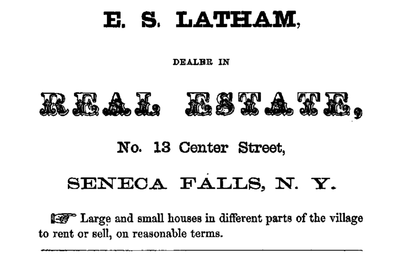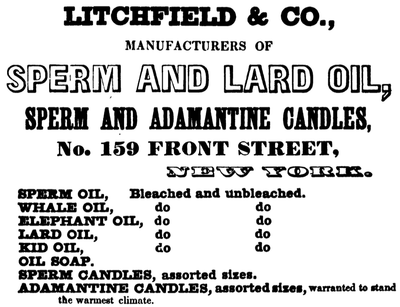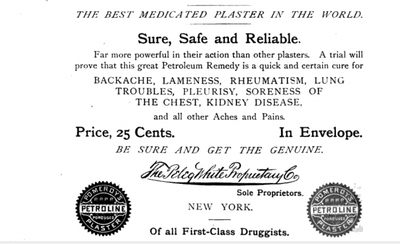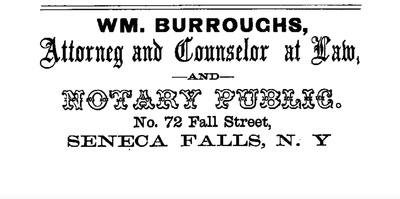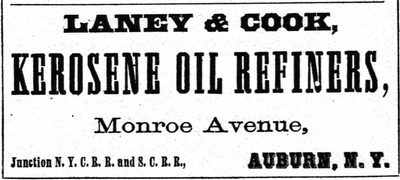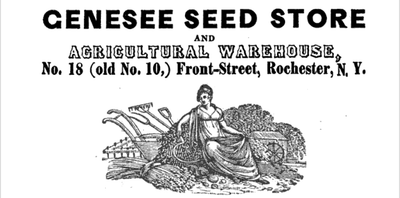Signer #89 left for Michigan before the ink on the Declaration of Sentiments had dried.
Read MoreSearching for the Seneca Falls 100
This research blog attempts to locate and profile the 68 women and 32 men who signed the Declaration of Sentiments at the 1848 Seneca Falls Convention.
Signer Profiles
Signer #94's family immigrated to Michigan in the 1860s. His family line came to a sad end in 1914.
Read MoreA 1923 celebration of the Seneca Falls Convention reveals an important clue about the identity of Signer #58.
Read MoreA piece of Convention lore suggests that one crucial person was absent.
Read MoreSigner #53 sought her dead father's advice on how to run the family business.
Read MoreA renowned inventor and scientist, Signer #70 had to conceal a youthful indiscretion.
Read MoreOne final search uncovered shocking details about the suicide of Signer #82.
Read MoreSigner #56 was widowed by the frontier.
Read MoreSix months after the Seneca Falls Convention, Signer #13 was forced to sell the family farm.
Read MoreIn her lifetime, Signer #3 joined two intentional communities...with mixed results.
Read MoreThe Declaration
"Declaration of Sentiments"
From: Report of the Woman's Rights Convention, Held at Seneca Falls, N.Y.,
July 19th and 20th, 1848. Rochester: Printed by John Dick, at the North Star Office, 1848.

When, in the course of human events, it becomes necessary for one portion of the family of man to assume among the people of the earth a position different from that which they have hitherto occupied, but one to which the laws of nature and of nature's God entitle them, a decent respect to the opinions of mankind requires that they should declare the causes that impel them to such a course.
We hold these truths to be self-evident: that all men and women are created equal; that they are endowed by their Creator with certain inalienable rights; that among these are life, liberty, and the pursuit of happiness; that to secure these rights governments are instituted, deriving their just powers from the consent of the governed. Whenever any form of Government becomes destructive of these ends, it is the right of those who suffer from it to refuse allegiance to it, and to insist upon the institution of a new government, laying its foundation on such principles, and organizing its powers in such form as to them shall seem most likely to effect their safety and happiness. Prudence, indeed, will dictate that governments long established should not be changed for light and transient causes; and accordingly,all experience hath shown that mankind are more disposed to suffer, while evils are sufferable, than to right themselves, by abolishing the forms to which they are accustomed. But when a long train of abuses and usurpations, pursuing invariably the same object, evinces a design to reduce them under absolute despotism, it is their duty to throw off such government, and to provide new guards for their future security. Such has been the patient sufferance of the women under this government, and such is now the necessity which constrains them to demand the equal station to which they are entitled.evinces a design to reduce them under absolute despotism, it is their duty to throw off such government, and to provide new guards for their future security. Such has been the patient sufferance of the women under this government,and such is now the necessity which constrains them to demand the equal station to which they are entitled.evinces a design to reduce them under absolute despotism, it is their duty to throw off such government, and to provide new guards for their future security. Such has been the patient sufferance of the women under this government, and such is now the necessity which constrains them to demand the equal station to which they are entitled.and such is now the necessity which constrains them to demand the equal station to which they are entitled.and such is now the necessity which constrains them to demand the equal station to which they are entitled.
The history of mankind is a history of repeated injuries and usurpations on the part of man toward woman, having in direct object the establishment of an absolute tyranny over her. To prove this, let facts be submitted to a candid world.
He has never permitted her to exercise her inalienable right to the elective franchise.
He has compelled her to submit to laws, in the formation of which she had no voice.
He has withheld from her rights which are given to the most ignorant and degraded men - both natives and foreigners.
Having deprived her of this first right of a citizen, the elective franchise, thereby leaving her without representation in the halls of legislation, he has oppressed her on all sides.
He has made her, if married, in the eye of the law, civilly dead.
He has taken from her all right in property, even to the wages she earns.
He has made her, morally, an irresponsible being, as she can commit many crimes, with impunity, provided they be done in the presence of her husband. In the covenant of marriage, she is compelled to promise obedience to her husband, he becoming, to all intents and purposes, her master - the law giving him power to deprive her of her liberty, and to administer chastisement.
He has so framed the laws of divorce, as to what shall be the proper causes of divorce; in case of separation, to whom the guardianship of the children shall be given, as to be wholly regardless of the happiness of women - the law, in all cases, going upon the false supposition of the supremacy of man, and giving all power into his hands.
After depriving her of all rights as a married woman, if single and the owner of property, he has taxed her to support a government which recognizes her only when her property can be made profitable to it.
He has monopolized nearly all the profitable employments, and from those she is permitted to follow, she receives but a scanty remuneration.
He closes against her all the avenues to wealth and distinction, which he considers most honorable to himself. As a teacher of theology, medicine, or law, she is not known.
He has denied her the facilities for obtaining a thorough education - all colleges being closed against her.
He allows her in Church as well as State, but a subordinate position, claiming Apostolic authority for her exclusion from the ministry, and with some exceptions, from any public participation in the affairs of the Church.
He has created a false public sentiment, by giving to the world a different code of morals for men and women, by which moral delinquencies which exclude women from society, are not only tolerated but deemed of little account in man.
He has usurped the prerogative of Jehovah himself, claiming it as his right to assign for her a sphere of action, when that belongs to her conscience and her God.
He has endeavored, in every way that he could to destroy her confidence in her own powers, to lessen her self-respect, and to make her willing to lead a dependent and abject life.
Now, in view of this entire disfranchisement of one-half the people of this country, their social and religious degradation, - in view of the unjust laws above mentioned, and because women do feel themselves aggrieved, oppressed, and fraudulently deprived of their most sacred rights, we insist that they have immediate admission to all the rights and privileges which belong to them as citizens of these United States.
In entering upon the great work before us, we anticipate no small amount of misconception, misrepresentation, and ridicule; but we shall use every instrumentality within our power to effect our object. We shall employ agents, circulate tracts, petition the State and national Legislatures, and endeavor to enlist the pulpit and the press in our behalf. We hope this Convention will be followed by a series of Conventions, embracing every part of the country.
Firmly relying upon the final triumph of the Right and the True, we do this day affix our signatures to this declaration.
Lucretia Mott
Harriet Cady Eaton
Margaret Pryor
Elizabeth Cady Stanton
Eunice Newton Foote
Mary Ann M'Clintock
Margaret Schooley
Martha C. Wright
Jane C. Hunt
Amy Post
Catharine F. Stebbins
Mary Ann Frink
Lydia Mount
Delia Mathews
Catharine C. Paine
Elizabeth W. M'Clintock
Malvina Seymour
Phebe Mosher
Catharine Shaw
Deborah Scott
Sarah Hallowell
Mary M'Clintock
Mary Gilbert
Sophrone Taylor
Cynthia Davis
Hannah Plant
Lucy Jones
Sarah Whitney
Mary H. Hallowell
Elizabeth Conklin
Sally Pitcher
Mary Conklin
Susan Quinn
Mary S. Mirror
Phebe King
Julia Ann Drake
Charlotte Woodward
Martha Underhill
Dorothy Mathews
Eunice Barker
Sarah R. Woods
Lydia Gild
Sarah Hoffman
Elizabeth Leslie
Martha Ridley
Rachel D. Bonnel
Betsey Tewksbury
Rhoda Palmer
Margaret Jenkins
Cynthia Fuller
Mary Martin
P. A. Culvert
Susan R. Doty
Rebecca Race
Sarah A. Mosher
Mary E. Vail
Lucy Spalding
Lavinia Latham
Sarah Smith
Eliza Martin
Maria E. Wilbur
Elizabeth D. Smith
Caroline Barker
Ann Porter
Experience Gibbs
Antoinette E. Segur
Hannah J. Latham
Sarah Sisson
The following are the names of the gentlemen present in favor of the movement:
Richard P. Hunt
Samuel D. Tillman
Justin Williams
Elisha Foote
Frederick Douglass
Henry W. Seymour
Henry Seymour
David Spalding
William G. Barker
Elias J. Doty
John Jones
William S. Dell
James Mott
William Burroughs
Robert Smallbridge
Jacob Mathews
Charles L. Hoskins
Thomas M'Clintock
Saron Phillips
Jacob P. Chamberlain
Jonathan Metcalf
Nathan J. Milliken
S.E. Woodworth
Edward F. Underhill
George W. Pryor
Joel Bunker
Isaac Van Tassel
Thomas Dell
E. W. Capron
Stephen Shear
Henry Hatley
Azaliah Schooley
From: Report of the Woman's Rights Convention, Held at Seneca Falls, N.Y.,
July 19th and 20th, 1848. Rochester: Printed by John Dick, at the North Star Office, 1848.

When, in the course of human events, it becomes necessary for one portion of the family of man to assume among the people of the earth a position different from that which they have hitherto occupied, but one to which the laws of nature and of nature's God entitle them, a decent respect to the opinions of mankind requires that they should declare the causes that impel them to such a course.
We hold these truths to be self-evident: that all men and women are created equal; that they are endowed by their Creator with certain inalienable rights; that among these are life, liberty, and the pursuit of happiness; that to secure these rights governments are instituted, deriving their just powers from the consent of the governed. Whenever any form of Government becomes destructive of these ends, it is the right of those who suffer from it to refuse allegiance to it, and to insist upon the institution of a new government, laying its foundation on such principles, and organizing its powers in such form as to them shall seem most likely to effect their safety and happiness. Prudence, indeed, will dictate that governments long established should not be changed for light and transient causes; and accordingly,all experience hath shown that mankind are more disposed to suffer, while evils are sufferable, than to right themselves, by abolishing the forms to which they are accustomed. But when a long train of abuses and usurpations, pursuing invariably the same object, evinces a design to reduce them under absolute despotism, it is their duty to throw off such government, and to provide new guards for their future security. Such has been the patient sufferance of the women under this government, and such is now the necessity which constrains them to demand the equal station to which they are entitled.evinces a design to reduce them under absolute despotism, it is their duty to throw off such government, and to provide new guards for their future security. Such has been the patient sufferance of the women under this government,and such is now the necessity which constrains them to demand the equal station to which they are entitled.evinces a design to reduce them under absolute despotism, it is their duty to throw off such government, and to provide new guards for their future security. Such has been the patient sufferance of the women under this government, and such is now the necessity which constrains them to demand the equal station to which they are entitled.and such is now the necessity which constrains them to demand the equal station to which they are entitled.and such is now the necessity which constrains them to demand the equal station to which they are entitled.
The history of mankind is a history of repeated injuries and usurpations on the part of man toward woman, having in direct object the establishment of an absolute tyranny over her. To prove this, let facts be submitted to a candid world.
He has never permitted her to exercise her inalienable right to the elective franchise.
He has compelled her to submit to laws, in the formation of which she had no voice.
He has withheld from her rights which are given to the most ignorant and degraded men - both natives and foreigners.
Having deprived her of this first right of a citizen, the elective franchise, thereby leaving her without representation in the halls of legislation, he has oppressed her on all sides.
He has made her, if married, in the eye of the law, civilly dead.
He has taken from her all right in property, even to the wages she earns.
He has made her, morally, an irresponsible being, as she can commit many crimes, with impunity, provided they be done in the presence of her husband. In the covenant of marriage, she is compelled to promise obedience to her husband, he becoming, to all intents and purposes, her master - the law giving him power to deprive her of her liberty, and to administer chastisement.
He has so framed the laws of divorce, as to what shall be the proper causes of divorce; in case of separation, to whom the guardianship of the children shall be given, as to be wholly regardless of the happiness of women - the law, in all cases, going upon the false supposition of the supremacy of man, and giving all power into his hands.
After depriving her of all rights as a married woman, if single and the owner of property, he has taxed her to support a government which recognizes her only when her property can be made profitable to it.
He has monopolized nearly all the profitable employments, and from those she is permitted to follow, she receives but a scanty remuneration.
He closes against her all the avenues to wealth and distinction, which he considers most honorable to himself. As a teacher of theology, medicine, or law, she is not known.
He has denied her the facilities for obtaining a thorough education - all colleges being closed against her.
He allows her in Church as well as State, but a subordinate position, claiming Apostolic authority for her exclusion from the ministry, and with some exceptions, from any public participation in the affairs of the Church.
He has created a false public sentiment, by giving to the world a different code of morals for men and women, by which moral delinquencies which exclude women from society, are not only tolerated but deemed of little account in man.
He has usurped the prerogative of Jehovah himself, claiming it as his right to assign for her a sphere of action, when that belongs to her conscience and her God.
He has endeavored, in every way that he could to destroy her confidence in her own powers, to lessen her self-respect, and to make her willing to lead a dependent and abject life.
Now, in view of this entire disfranchisement of one-half the people of this country, their social and religious degradation, - in view of the unjust laws above mentioned, and because women do feel themselves aggrieved, oppressed, and fraudulently deprived of their most sacred rights, we insist that they have immediate admission to all the rights and privileges which belong to them as citizens of these United States.
In entering upon the great work before us, we anticipate no small amount of misconception, misrepresentation, and ridicule; but we shall use every instrumentality within our power to effect our object. We shall employ agents, circulate tracts, petition the State and national Legislatures, and endeavor to enlist the pulpit and the press in our behalf. We hope this Convention will be followed by a series of Conventions, embracing every part of the country.
Firmly relying upon the final triumph of the Right and the True, we do this day affix our signatures to this declaration.
Lucretia Mott

Harriet Cady Eaton

Margaret Pryor
Elizabeth Cady Stanton

Eunice Newton Foote

Mary Ann M'Clintock
Margaret Schooley
Martha C. Wright

Jane C. Hunt
Amy Post

Catharine F. Stebbins

Mary Ann Frink
Lydia Mount
Delia Mathews
Catharine C. Paine
Elizabeth W. M'Clintock
Malvina Seymour
Phebe Mosher
Catharine Shaw
Deborah Scott
Sarah Hallowell

Mary M'Clintock
Mary Gilbert
Sophrone Taylor
Cynthia Davis
Hannah Plant
Lucy Jones
Sarah Whitney
Mary H. Hallowell

Elizabeth Conklin
Sally Pitcher
Mary Conklin
Susan Quinn
Mary S. Mirror
Phebe King
Julia Ann Drake
Charlotte Woodward

Martha Underhill
Dorothy Mathews

Eunice Barker
Sarah R. Woods
Lydia Gild
Sarah Hoffman
Elizabeth Leslie
Martha Ridley
Rachel D. Bonnel
Betsey Tewksbury
Rhoda Palmer

Margaret Jenkins
Cynthia Fuller
Mary Martin
P. A. Culvert
Susan R. Doty

Rebecca Race

Sarah A. Mosher
Mary E. Vail
Lucy Spalding
Lavinia Latham
Sarah Smith
Eliza Martin
Maria E. Wilbur
Elizabeth D. Smith
Caroline Barker
Ann Porter
Experience Gibbs
Antoinette E. Segur
Hannah J. Latham
Sarah Sisson
The following are the names of the gentlemen present in favor of the movement:
Richard P. Hunt

Samuel D. Tillman

Justin Williams
Elisha Foote

Frederick Douglass

Henry W. Seymour
Henry Seymour
David Spalding
William G. Barker
Elias J. Doty
John Jones
William S. Dell
James Mott

William Burroughs
Robert Smallbridge

Jacob Mathews
Charles L. Hoskins
Thomas M'Clintock

Saron Phillips
Jacob P. Chamberlain

Jonathan Metcalf
Nathan J. Milliken
S.E. Woodworth

Edward F. Underhill
George W. Pryor
Joel Bunker
Isaac Van Tassel
Thomas Dell
E. W. Capron

Stephen Shear
Henry Hatley
Azaliah Schooley

Stanton's Address

From “Proceedings of the Woman’s Rights Conventions, Held at Seneca Falls & Rochester, N.Y., July & August 1848.” New York: Robert J. Johnston, 1870.
I should feel exceedingly diffident to appear before you at this time, having never before spoken in public, were I not nerved by a sense of right and duty, did I not feel the time had fully come for the question of woman's wrongs to be laid before the public, did I not believe that woman herself must do this work ; for woman alone can understand the height, the depth, the length, and the breadth of her own degradation. Man cannot speak for her, because he has been educated to believe that she differs from him so materially, that he cannot judge of her thoughts, feelings, and opinions by his own. Moral beings can only judge of others by themselves. The moment they assume a different nature for any of their own kind, they utterly fail. The drunkard was hopelessly lost until it was discovered that he was governed by the same laws of mind as the sober man. Then with what magic power, by kindness and love, was he raised from the slough of despond and placed rejoicing on high land.
Let a man once settle the question that a woman does not think and feel like himself, and he may as well undertake to judge of the amount of intellect and sensation of any of the animal creation as of woman's nature. He can know but little with certainty, and that but by observation.
Among the many important questions which have been brought before the public, there, is none that more vitally affects the whole human family than that which is technically called Woman's Eights. Every allusion to the degraded and inferior position occupied by women all over the world has been met by scorn and abuse. From the man of highest mental cultivation to the most degraded wretch who staggers in the streets do we meet ridicule, and coarse jests, freely be stowed upon those who dare assert that woman stands by the side of man, his equal, placed here by her God, to enjoy with him the beautiful earth, which is her home as it is his, having the same sense of right and wrong, and looking to the same Being for guidance and support. So long has man exercised tyranny over her, injurious to himself and benumbing to her faculties, that few can nerve them selves to meet the storm ; and so long has the chain been about her that she knows not there is a remedy.
The whole social, civil and religious condition of woman is a subject too vast to be brought within the limits of one short lecture. Suffice it to say, for the. present, wherever we turn, the history of woman is sad and dark, without any alleviating circumstances, nothing from which we can draw consolation.
As the nations of the earth emerge from a state of barbarism, the sphere of woman gradually becomes wider, but not even under what is thought to be the full blaze of the sun of civilization is it what God designed it to be. In every country and clime does man assume the responsibility of marking out the path for her to tread. In every country does he regard her as a being inferior to himself, and one whom he is to guide and control. From the Arabian Kerek, whose wife is obliged to steal from her husband to supply the necessities of life ; from the Mahometan who forbids pigs, dogs, women, and other impure animals, to enter a Mosque, and does not allow a fool, madman or woman to proclaim the hour of prayer ; from the German who complacently smokes his meerschaum, while his wife, yoked with the ox, draws the plough through its furrow; from the delectable carpet-knight, who thinks an inferior style of conversation adapted to woman, to the legislator, who con siders her incapable of saying what laws shall govern her, is the same feeling manifested.
In all eastern countries she is a mere slave, bought and sold at pleasure. There are many differences in habits, manners and customs among the heathen nations of the Old World, but there is little change for the better in woman's lot. She is either the drudge of man, to perform all the hard labor of the field, and all the menial duties of the hut, tent or house, or she is the idol of his lust, the mere creature of his varying whims and will. Truly has she herself said in her best estate,
I am a slave, a favored slave,
To share his pleasures and seem very blest,
When weary of these fleeting charms and me
There yawns the sack, and yonder the rolling sea,
What, am I then a toy for dotards play
To wear but till the gilding frets away?
In Christian countries, boasting a more advanced state of civilization and refinement, woman still holds a position infinitely inferior to man.
In France the Salic Law tells much, although it is said that woman there has ever had great influence in all political revolutions. In England she seems to have advanced a little, there she has a right to the throne, and is allowed to hold some other offices, and to vote on some questions. But in the United States of America, in a republic based on the theory that no just government can be formed without the consent of the governed, woman has no right either to hold office, or to the elective franchise. She stands at this moment unrepresented in this government, her rights and interests wholly over
looked.
There is a class of men who believe in their natural, inborn, inbred superiority, and their heaven-descended right to dominion over the fish of the sea, the fowl of the air, and last, though not least, the immortal being called woman. I would recommend this class to the attentive perusal of their Bibles—Gen., 1. xxviii.; to historical research, to foreign travel, to a closer observation of the manisfestations [sic] of mind about them, and to a humble comparison of themselves with such women as Catharine of Russia, Elizabeth of England, distinguished for their statesmanlike qualities ; Harriet Martineau and Madame De Stael, for their literary attainments ; or Caroline Herschel and Mary Somerville for their scientific researches ; or for physical equality, to that whole nation of famous women, the Amazons. We seldom find this class of objectors among liberally educated persons, who have the advantage of observing the race in different countries, climes and phases. But barbarians though they be, in entertaining such an opinion, they must be met and fairly vanquished. Let us consider, then, man's superiority, intellectually, morally, physically.
Man's intellectual superiority cannot be a question until woman has had a fair trial. When we shall have had our freedom to find out our own sphere, when we shall have had our colleges, our professions, our trades, for a century, a comparison then may be justly instituted. When woman, instead of being taxed to endow colleges where she is forbidden to enter—instead of forming sewing societies to educate "poor, but pious," young men, shall first educate herself, when she shall be just to herself before she is generous to others ; improving the talents God has given her, and leaving her neighbor to do the same for himself, we shall not then hear so much about this boasted superiority. How often, now, we see young men carelessly throwing away the intellectual food their sisters crave. A little music, that she may while an hour away pleasantly, a little French, a smattering of the sciences, and in rare instances, some slight classical knowledge, and woman is considered highly educated. She leaves her books and studies just as a young man is entering thoroughly into his. Then comes the gay routine of fashionable life, courtship and marriage, the perplexities of house and children, and she knows nothing beside. Her sphere is home. And whatever yearning her spirit may have felt for a higher existence, whatever may have been the capacity she well knew she possessed for more elevated enjoyments, enjoyments which would not conflict with those holy duties, but add new lustre to them, all, all is buried beneath the weight of these undivided cares.
 Men, bless their innocence, are fond of representing themselves as beings of reason, of intellect, while women are mere creatures of the affections. There is a self-conceit that makes the possessor infinitely happy, and we would dislike to dispel the illusion if it were possible to endure it. But so far as we can observe, it is pretty much now-a-days as it was with Adam of old. No doubt you all recollect the account we have given us. A man and a woman were placed in a beautiful garden, with everything about them that could contribute to their enjoyment. Trees and shrubs, fruits and flowers, and gently murmuring streams made glad their hearts. Zephyrs freighted with delicious odors fanned their brows, and the serene stars looked down upon them with eyes of love. The Evil One saw their happiness, and it troubled him, and he set his wits to work to know how he should destroy it. He thought that man could be easily conquered through his affection for the woman, but the woman would require more management, she could be reached only through her intellectual nature. So he promised her the knowledge of good and evil. He told her the sphere of her reason should be enlarged. He promised to gratify the desires she felt for intellectual improvement. So he prevailed and she did eat. Did the Evil One judge rightly in regard to man? Eve took the apple, went to Adam, and said ; "Dear Adam, taste this apple. If you love me, eat?” Adam stopped not so much as to ask if the apple were sweet or sour. He knew he was doing wrong, but his love for Eve prevailed, and he did eat. Which, I ask you, was the creature of the affections?
Men, bless their innocence, are fond of representing themselves as beings of reason, of intellect, while women are mere creatures of the affections. There is a self-conceit that makes the possessor infinitely happy, and we would dislike to dispel the illusion if it were possible to endure it. But so far as we can observe, it is pretty much now-a-days as it was with Adam of old. No doubt you all recollect the account we have given us. A man and a woman were placed in a beautiful garden, with everything about them that could contribute to their enjoyment. Trees and shrubs, fruits and flowers, and gently murmuring streams made glad their hearts. Zephyrs freighted with delicious odors fanned their brows, and the serene stars looked down upon them with eyes of love. The Evil One saw their happiness, and it troubled him, and he set his wits to work to know how he should destroy it. He thought that man could be easily conquered through his affection for the woman, but the woman would require more management, she could be reached only through her intellectual nature. So he promised her the knowledge of good and evil. He told her the sphere of her reason should be enlarged. He promised to gratify the desires she felt for intellectual improvement. So he prevailed and she did eat. Did the Evil One judge rightly in regard to man? Eve took the apple, went to Adam, and said ; "Dear Adam, taste this apple. If you love me, eat?” Adam stopped not so much as to ask if the apple were sweet or sour. He knew he was doing wrong, but his love for Eve prevailed, and he did eat. Which, I ask you, was the creature of the affections?In consideration of man's claim to moral superiority, glance now at our theological seminaries, our divinity students, the long line of descendants from our Apostolic fathers, the immaculate priesthood, and what do we find here? Perfect moral rectitude in every relation of life, a devoted spirit of self-sacrifice, a perfect union of thought, opinion and feeling among those who profess to worship the one God, and whose laws they feel themselves called upon to declare to a fallen race? Far from it. These persons, all so thoroughly acquainted with the character of God, and of His designs, made manifest by His words and works, are greatly divided among themselves. Every sect has its God, every sect has its Bible, and there is as much bitterness, envy, hatred and malice between those contending sects, yea, even more, than in our political parties during the periods of their greatest excitement. Now the leaders of these sects are the priest hood, who are supposed to have passed their lives, almost, in the study of the Bible, in various languages and with various commentaries—in the contemplation of the infinite, the eternal, the glorious future open to the redeemed of earth. Are they distinguished among men for their holy aspirations, their virtue, purity and chastity? Do they keep themselves unspotted from the world? Is the moral and religious life of this class what we might expect from minds said to be fixed on such mighty themes? By no means. Not a year passes but we hear of some sad, soul-sickening deed, perpetrated by some of this class. If such be the state of the most holy, we need not pause now to consider those classes who claim of us less reverence and respect. The lamentable want of principle among our lawyers, generally, is too well known to need comment. The everlasting back biting and bickering of our physicians is proverbial. The disgraceful riots at our polls, where man, in performing the highest duty of citizenship, and ought surely to be sober-minded, the perfect rowdyism that now characterizes the debates in our national Congress,—all these are great facts which rise up against man's claim foe moral superiority. In my opinion, he is infinitely woman's inferior in every moral quality, not by nature, but made so by a false education. In carrying out his own selfishness, man has greatly improved woman's moral nature, but by an almost total shipwreck of his own. Woman has now the noble virtues of the martyr. She is early schooled to self-denial and suffering. But man is not so wholly buried in selfishness that he does not sometimes get a glimpse of the narrowness of his soul, as compared with woman. Then he says, by way of an excuse for his degradation, “God made woman more self-denying than man. It is her nature. It does not cost her as much to give up her wishes, her will, her life, even, as it does him. He is naturally selfish. God made him so.”
No ! think not that He who made the heavens and the earth, the whole planetary world, ever moving in such harmony and order, that He who so bountifully scattered through all nature so much that fills us with admiration and wonder, that He who made the mighty ocean, mountain and cataract, the bright birds and tender flowers, that He who made man in his own image, perfect, noble and pure, loving justice, mercy and truth,—oh say not that he has had any part in the production of that creeping, cringing, crawling, debased, selfish monster, now extant, claiming for himself the name of man. No ! God's commands rest upon man as well as woman. It is as much his duty to be kind, self-denying and full of good works, as it is hers. As much his duty to absent himself from scenes of violence as it is hers. A place or position that would require the sacrifice of the delicacy and refinement of woman's nature is unfit for man, for these virtues should be as carefully guarded in him as in her. The false ideas that prevail with regard to the purity necessary to constitute the perfect character in woman, and that requisite for man, has done an infinite deal of mischief in the world. I would not have woman less pure, but I would have man more so. I would have the same code of morals for both. Delinquencies which exclude woman from the society of the true and the good, should assign to man the same place. Our laxity towards him has been the fruitful source of dissipation, drunkenness, debauchery and immorality of all kinds, It has not only affected woman injuriously, but he himself has been the greatest sufferer. It has destroyed the nobility of his character, the transparency of his soul, and all those finer qualities of our nature which raise us above the earth and give us a foretaste of the refined enjoyments of the world to come,
Let us now consider man's claim to physical superiority. Methinks I hear some say, surely, you will not contend for equality here. Yes, we must not give an inch, lest you take an ell. We cannot accord to man even this much, and he has no right to claim it until the fact has been fully demonstrated. Until the physical education of the boy and the girl shall have been the same for many years. If you claim the advantage of size, merely, why, it may be that under any course of training, in ever so perfect a development of physique in woman, man might still be the larger of the two, though we do not grant even this. But the perfection of the physique is great power combined with endurance. Now your strongest men are not always the tallest men, nor the broadest, nor the most corpulent, but very, often the small, elastic man, who is well built, tightly put together, and possessed of an indomitable will. Bodily strength depends much on the power of the will. The sight of a small boy thoroughly thrashing a big one, is not rare. Now, would you say the big, fat boy whipped, was superior to the small active boy who conquered him? You do not say the horse is physically superior to man, for although he has more muscular power, yet the power of mind in man renders him his superior, and he guides him wherever he will. The power of mind seems to be in no way connected with the size and strength of body. Many men of herculean powers of mind have been small and weak in body. The late distinguished Dr. Channing, of Boston, was feeble in appearance and voice, yet he has moved the world by the eloquence of his pen. John Quincy Adams was a small man of little muscular power, yet we know he had more courage than all the Northern doughfaces, six feet high and well proportioned, that ever represented us at our capitol. Mental power depends far more on the temperament, than on the size of the head or the size of the body. I never heard that Daniel Lambert was distinguished for any great mental achievements. We cannot say what the woman might be physically, if the girl were allowed all the freedom of the boy in romping, climbing, swimming, playing whoop and ball. Among some of the Tartar tribes of the present day, women manage a horse, hurl a javelin, hunt wild animals, and fight an enemy as well as a man. The Indian women endure fatigues and carry burdens that some of our fair-faced, soft-handed, moustached young gentlemen would consider quite impossible for them to sustain. The Croatian and Wallachian women perform all the agricultural operations in addition to their domestic labors, and it is no uncommon sight in our cities, to see the German immigrant with his hands in his pockets, walking complacently by the side of his wife, whilst she bears the weight of some huge package or piece of furniture upon her head. Physically, as well as intellectually, it is use that produces growth and development.
But there is a class of objectors, who say they do not claim superiority, they merely assert a difference. But you will find by following them up closely, that they soon run this difference into the old groove of superiority. The phrenologist says that woman's head has just as many organs as man's, and that they are similarly situated. He says, too, that the organs most used are most prominent. They do not divide heads according to sex, but they call all the fine heads masculine, and the inferior feminine. When a woman presents a well-developed intellectual region, they say she has a masculine head, as if there could be nothing remarkable of the feminine gender. When a man has a small head, with little reasoning power, and the affections strongly developed, they say he has a woman's head, thus giving all reasoning power to the masculine gender.
Some say our heads are less,
Some men's are small, not they the least of men,
For often fineness compensates for size,
Besides the brain is like the hand, and grows with using.
We have met here to-day to discuss our rights and wrongs, civil and political, and not, as some have supposed, to go into the detail of social life alone. We do not propose to petition the legislature to make our husbands just, generous and courteous, to seat every man at the head of a cradle, and to clothe every woman in male attire. None of these points, however important they may be considered by leading men, will be touched in this Convention. As to their costume, the gentlemen need feel no fear of our imitating that, for we think it in violation of every principle of taste, beauty and dignity ; notwithstanding all the contempt cast upon our loose, flowing garments, we still admire the graceful folds, and consider our costume far more artistic than theirs. Many of the nobler sex seem to agree with us in this opinion, for the bishops, priests, judges, barristers, and lord-mayors of the first nation on the globe, and the Pope of Rome, with his Cardinals, too, all wear the loose flowing robes, thus tacitly acknowledging that the male attire is neither dignified nor imposing. No, we shall not molest you in your philosophical experiments with stocks, pants, high-heeled boots and Russian belts. Yours be the glory to discover, by personal experience, how long the knee-pan can resist the terrible strapping down which you impose, in how short time the well developed muscles of the throat can be reduced to mere threads by the constant pressure of the stock, how high the heel of a boot must be to make a short man tall, and how tight the Russian belt may be drawn and yet have wind enough left to sustain life. But we are assembled to protest against a form of government, existing without the consent of the governed—to declare our right to be free as man is free, to be represented in the government which we are taxed to support, to have such disgraceful laws as give man the power to chastise and imprison his wife, to take the wages which she earns, the property which she inherits, and, in case of separation, the children of her love ; laws which makes her the mere dependent on his bounty. It is to protest against such unjust laws as these that we are assembled to-day, and to have them, if possible, forever erased from our statute-books, deeming them a shame and a disgrace to a Christian republic in the nineteenth century. We have met
To uplift woman's fallen divinity
Upon an even pedestal with man's.
And, strange as it may seem to many, we now demand our right to vote according to the declaration of the government under which we live. This right no one pretends to deny. We need not prove ourselves equal to Daniel Webster to enjoy this privilege, for the ignorant Irishman in the ditch has all the civil rights he has. We need not prove our muscular power equal to this same Irishman to enjoy this privilege, for the most tiny, weak, ill-shaped stripling of twenty-one, has all the civil rights of the Irishman. We have no objection to discuss the question of equality, for we feel that the weight of argument lies wholly with us, but we wish the question of equality kept distinct from the question of rights, for the proof of the one does not determine the truth of the other. All white men in this country have the same rights, however they may differ in mind, body or estate. The right is ours. The question now is, how shall we get possession of what rightfully belongs to us. We should not feel so sorely grieved if no man who had not attained the full stature of a Webster, Clay, Van Buren, or Gerrit Smith could claim the right of the elective franchise. But to have drunkards, idiots, horse-racing, rumselling rowdies, ignorant foreigners and silly boys fully recognized, while we ourselves are thrust out from all the rights that belong to citizens, it is too grossly insulting to the dignity of woman to be longer quietly submitted to. The right is ours. Have it, we must. Use it, we will. The pens, the tongues, the fortunes, the indomitable wills of many women are already pledged to secure this right. The great truth, that no just government can be formed without the consent of the governed, we shall echo and re-echo in the ears of the unjust judge, until by continual coming we shall weary him.
But, say some, would you have woman vote? What, refined, delicate women at the polls, mingling in such scenes of violence and vulgarity? Most certainly. Where there is so much to be feared for the pure, the innocent, the noble, the mother surely should be there, to watch and guard her sons who must encounter such stormy, dangerous scenes at the tender age of twenty-one. Much is said of woman's influence, might not her presence do much toward softening down this violence, refining this vulgarity? Depend upon it, the places that, by their impure atmosphere, are unfit for women, cannot but be dangerous to her sires and sons.
But, if woman claims all the rights of a citizen, will she buckle on her armor and fight in defence of her country? Has not woman already often shown herself as courageous in the field, as wise and patriotic in counsel as man? But for myself, I think all war sinful. I believe in Christ. I believe that command, “resist not evil,” to be divine. “Vengeance is mine, and I will repay, saith the Lord.” Let frail man, who cannot foresee the consequences of an action, walk humbly with his God, loving his enemies, blessing them who curse him, and always returning good for evil. This is the highest kind of courage that mortal man can attain to. And this moral warfare with our own bad passions requires no physical power to achieve. I would not have man go to war. I can see no glory in fighting with such weapons as guns and swords, whilst man has in his possession the infinitely superior ones of righteousness and truth.
But what would woman gain by voting? Men must know the advantages of voting, for they all seem very tenacious about the right. Think you, if woman had a voice in this government, that all those laws affecting her interests would so entirely violate every principle of right and justice ? Had woman a vote to give, might not the office holders and seekers propose some change in her condition? Might not Woman's Eights become as great a question as free soil?
“But are you not already represented by your fathers, husbands, brothers and sons?” Let your statute books answer the question. We have had enough of such representation. In nothing is woman's true happiness consulted. Men like to call her an angel—to feed her on what they think sweet food—nourishing her vanity ; to make her believe that her organization is so much finer than theirs, that she is not fitted to struggle with the tempests of public life, but needs their care and protection!! Care and protection—such as the wolf gives the lamb—such as the eagle the hare he carries to his eyrie!! Most cunningly he entraps her, and then takes from her all those rights which are dearer to him than life itself—rights which have been baptized in blood—and the maintenance of which is even now rocking to their foundations the kingdoms of the Old World.
The most discouraging, the most lamentable aspect our cause wears is the indifference, indeed, the contempt with which women themselves regard the movement. Where the subject is introduced, among those even who claim to be intelligent and educated, it is met by the scornful curl of the lip, and by expression of ridicule and disgust. But we shall hope better things of them when they are enlightened in regard to their present position. When women know the laws and constitutions under which they live, they will not publish their degradation, by declaring themselves satisfied, nor their ignorance, by declaring they have all the rights they want. They are not the only class of beings who glory in their bondage. In the Turkish harem, in those Seraglios, where intellect and soul are buried beneath the sensualism and brutality which are the inevitable results of woman's degradation, even there, she declares herself not only satisfied with her position, but glories in it. Miss Martineau, in her “Travels in the East,” recently published, says, referring [sic] to the inmates of the harems: “Everywhere they pitied us European women heartily, that we had to go about travelling, and appearing in the streets without being properly taken care of, that is, watched.” They think us strangely neglected in being left so free, and boast of their spy system and imprisonment as tokens of the value in which they are held. Can woman here, although her spiritual and intellectual nature is recognized to a somewhat greater degree than among the Turks, and she is allowed the privilege of being in her nursery and kitchen, and although the Christian promises her the ascendency in heaven as man has it here, while the Mahometan closes the gates of the celestial city tight against her, can she be content, notwithstanding these good things, to be denied the pure enjoyments arising from a full cultivation of her mind, and an admission into all the rights and privileges which are hers ? She must and will, ere long, when her spirit awakens, and she learns to care less for the
Barren verbiage, current among men,
Light coin, the tinsel clink of compliment.
She must and will demand everywhere
Two heads in council—two beside the hearth,
Two in the tangled business of the world,
Two in the liberal offices of life,
Two plummets dropped to sound the abyss
Of science, and the secrets of the mind.
Let woman live as she should. Let her feel her accountability to her Maker. Let her know that her spirit is fitted for as high a sphere as man’s, and that her soul requires food as pure and exalted as his. Let her live first for God, and she will not make imperfect man an object of reverence and awe. Teach her her responsibility as a being of conscience and reason, that all earthly support is weak and unstable, that her only safe dependence is the arm of omnipotence, and that true happiness springs from duty accomplished. Thus will she learn the lesson of individual responsibility for time and eternity. That neither father, husband, brother or son, however willing they may be, can discharge her high duties of life, or stand in her stead when called into the presence of the great Searcher of Hearts at the last day. Methinks I hear some woman say, “Must we not obey our husbands? Does not the Bible so command us?” No, you have not rightly read your Bible. At the creation of our first parents, God called their name Adam, and gave them dominion over the fish of the sea, the fowls of the air, and every living thing that moved upon the earth, but he says nothing to them of obedience to each other. After the fall, after Noah come out of the ark, he addressed them in like manner. The chief support that man finds for this authority over woman in the Bible, he gets from St. Paul. It needs but little consideration to see how limited this command of St. Paul must be, even if you give it all the weight which is usually claimed. “Wives, obey your husbands in the Lord.” Now as the command is given to me, I am of course to be the judge of what is “in the Lord,” and this opens a wide field of escape from any troublesome commands. There can be no subordination where the one to whom a command is given is allowed to sit in judgment on the character of the command. The Bible argument on this subject would of itself afford sufficient material for an entire lecture. I shall not, therefore, attempt to go into it at this time, enough to say that that best of Books is ever on the side of freedom, and we shrink not from pleading our cause on its principles of universal justice and love.
Let me here notice one of the greatest humbugs of the day, which has long found for itself the most valuable tool in woman—“The Education Society.” The idea, to me, is simply absurd, for women, in their present degradation and ignorance, to form sewing societies for the education of young men for the ministry. An order of beings above themselves, claiming to be gifted with superior powers, having all the avenues to learning, wealth and distinction thrown freely open to them, who, if they had but the energy to avail themselves of all these advantages, could easily secure an education for themselves, while woman herself, poor, friendless, robbed of all her rights, oppressed on all sides, civilly, religiously and socially, must needs go ignorant herself. Now, is not the idea preposterous, for such a being to educate a great, strong, lazy man, by working day and night with her needle, stitch, stitch, [sic] and the poor widow always throws in her mite, being taught to believe that all she gives for the decoration of churches and their black-coated gentry, is given unto the Lord. I think a man, who, under such conditions, has the moral hardihood to take an education at the hands of woman, and at such an expense to her, should, as soon as he graduates, with all his honors thick upon him, take the first ship for Turkey, and there pass his days in earnest efforts to rouse the inmates of the harems to a true sense of their degradation, and not, as is his custom, immediately enter our pulpits to tell us of his superiority to us, “weaker vessels”—his prerogative to command, ours to obey—his duty to preach, ours to keep silence. Oh, for the generous promptings of the days of chivalry. Oh, for the poetry of romantic gallantry. May they shine on us once more. Then may we hope that these pious young men, who profess to believe in the golden rule, will clothe and educate themselves and encourage woman to do the same for herself ; or perhaps they might conceive the happy thought of reciprocating the benefits so long enjoyed by them. There is something painfully affecting in the self-sacrifice and generosity of women, who can neither read nor write their own language with correctness, going about begging money for the education of men. The last time when an appeal of this kind was made to me, I told the young girl that I would send her to school a year, if she would go, but I would never again give one red cent to the Education Society. And I do hope that every Christian woman, who has the least regard for her sex, will make the same resolve. We have worked long enough for man, and at a most unjust and unwarrantable sacrifice of self, yet he gives no evidence of gratitude, but has, thus far, treated his benefactors with scorn, ridicule and neglect. But, say they, you do not need an education as we do. We expect to shine in the great world. Our education is our living. What, let me ask, is the real object of education. Just in proportion as the faculties which God hath given us are harmoniously developed, do we attain our highest happiness. And has not woman an equal right to happiness here as well as hereafter? And should she not have equal facilities with him for making an honest living while on this footstool?
 One common objection to this movement is, that if the principles of freedom and equality which we advocate were put into practice, it would destroy all harmony in the domestic circle. Here let me ask, how many truly harmonious households have we now? Look round your circle of friends : on the one hand you will find the meek, sad-ooking [sic], thoroughly subdued wife, with no freedom of thought or action, her days passed in the dull routine of household cares, and her nights half perchance in making tattered garments whole, and the other half in slumbers oft disturbed by sick and restless children. She knows nothing of the great world without; she has no time to read, and her husband finds more pleasure in discussing politics with men in groceries, taverns, or depots, than he could in reading or telling his wife the news, whilst she sits mending his stockings and shirts through many a lonely evening ; nor dreams he, selfish being, that he owes any duty to the perishing soul by his side, beyond providing a house to cover her head, with food and raiment. As to her little “heaven ordained” world within, she finds not much comfort there, for her will and wishes, should she have any, must be in subjection to that of her tyrant. The comfort of wife, children, servants, one and all, must be given up, wholly disregarded, until the great head of the house has all his wants supplied. No matter what the case may be, he must have his hot dinner. If wife or children are sick, they must look elsewhere for care; he cannot be disturbed at night ; it does not agree with him to have his slumbers broken, it gives him the headache and renders him unfit for business ; and, worse than all, how often woman's very soul is tortured by the harsh, brutal treatment of fathers toward their children. What mother cannot bear me witness to anguish of this sort. Oh ! women, how sadly you have learned your duty to your children, to the holy promptings of your own hearts, to the God that gave you that merciful love for them in all their wanderings, when you stand silent witnesses of the cruel infliction of blows and stripes from angry fathers on the trembling forms of helpless infancy. It is a mother's sacred duty to shield her children from violence, froni whatever source it may come. It is woman's mission to resist oppression wherever she may find it, whether at her own fireside, or on a Southern plantation, by every moral power within her reach. Many men, well known for their philanthropy, who hate oppression in the outer world, can play the tyrant right well at home. It is a much easier matter to denounce all the crying sins of the day, most eloquently, too, under the inspiration of applauding thousands, than to endure alone, for an hour, the peevish moaning of a sick child. To know whether a man is truly great and good, you must not judge by his actions in the great world, but follow him to his home, where all restraints are laid aside, and there you see the true man, his virtues and his vices, too.
One common objection to this movement is, that if the principles of freedom and equality which we advocate were put into practice, it would destroy all harmony in the domestic circle. Here let me ask, how many truly harmonious households have we now? Look round your circle of friends : on the one hand you will find the meek, sad-ooking [sic], thoroughly subdued wife, with no freedom of thought or action, her days passed in the dull routine of household cares, and her nights half perchance in making tattered garments whole, and the other half in slumbers oft disturbed by sick and restless children. She knows nothing of the great world without; she has no time to read, and her husband finds more pleasure in discussing politics with men in groceries, taverns, or depots, than he could in reading or telling his wife the news, whilst she sits mending his stockings and shirts through many a lonely evening ; nor dreams he, selfish being, that he owes any duty to the perishing soul by his side, beyond providing a house to cover her head, with food and raiment. As to her little “heaven ordained” world within, she finds not much comfort there, for her will and wishes, should she have any, must be in subjection to that of her tyrant. The comfort of wife, children, servants, one and all, must be given up, wholly disregarded, until the great head of the house has all his wants supplied. No matter what the case may be, he must have his hot dinner. If wife or children are sick, they must look elsewhere for care; he cannot be disturbed at night ; it does not agree with him to have his slumbers broken, it gives him the headache and renders him unfit for business ; and, worse than all, how often woman's very soul is tortured by the harsh, brutal treatment of fathers toward their children. What mother cannot bear me witness to anguish of this sort. Oh ! women, how sadly you have learned your duty to your children, to the holy promptings of your own hearts, to the God that gave you that merciful love for them in all their wanderings, when you stand silent witnesses of the cruel infliction of blows and stripes from angry fathers on the trembling forms of helpless infancy. It is a mother's sacred duty to shield her children from violence, froni whatever source it may come. It is woman's mission to resist oppression wherever she may find it, whether at her own fireside, or on a Southern plantation, by every moral power within her reach. Many men, well known for their philanthropy, who hate oppression in the outer world, can play the tyrant right well at home. It is a much easier matter to denounce all the crying sins of the day, most eloquently, too, under the inspiration of applauding thousands, than to endure alone, for an hour, the peevish moaning of a sick child. To know whether a man is truly great and good, you must not judge by his actions in the great world, but follow him to his home, where all restraints are laid aside, and there you see the true man, his virtues and his vices, too.On the other hand, in these “harmonious households,” you sometimes find the so-called “hen-pecked husband” oftimes a kind, generous, noble-minded man, who hates contention and is willing to do anything for peace. He having unwarily caught a Tartar, tries to make the best of her. He can think his own thoughts, tell them, too, when he feels quite sure that she is not at hand. He can absent himself from home, as much as possible, but he does not feel like a free man. The detail of his suffering I can neither describe or imagine, never having been the confident of one of these unfortunate beings ; but are not his sorrows all written in the book of the immortal Caudle, written by his own hand, that all may read and pity the poor man, though feeling all through that the hapless Mrs. Caudle had, after all, many reasons for her continual wail for substantial grief. Now, in the ordinary households we see there may be no open rupture; they may seemingly glide on without a ripple over the surface ; the aggrieved parties having resigned themselves to suffer all things with Christian fortitude, with stern philosophy, but there can be no harmony or happiness there. The only happy households we now see are those in which husband and wife share equally in counsel and government. There can be no true dignity or independence where there is subordination to the absolute will of another, no happiness without freedom. Let us then have no fears that this movement will disturb what is seldom found a truly united and happy family.
Is it not strange that man—with the pages of history all spread out before him—is so slow to admit the intellectual power, the moral heroism of woman, and her identity with himself. That there have been comparatively a greater number of good queens than of good kings is a fact stated by several historians. Zenobia, the celebrated queen of the East, is not exceeded by any king on record for talent, courage and daring ambition. The Emperor Aurelian, while besieging [sic] her beautiful city of Palmes, writes thus : “The Roman people speak with contempt of the war I am waging with a woman, but they are ignorant both of the character and power of Zenobia.” She was possessed of attainments very unusual in that age, and was a liberal patron of literature and science. No contemporary sovereign is represented as capable of such high pursuits. Margaret, Queen of Denmark, Norway and Sweden, justly called the Semiramis of the North, by her talent, energy, firmness and foresight, raised herself to a degree of power and grandeur then unequalled In Europe. No monarch has ever rivalled Isabella of Spain, in bravery, sagacity, political wisdom, and a proud sense of honor. Yet these characteristics were united with the purest modesty and the warmest feminine affections. Ferdinand, her husband, was her inferior in mind, heart and nobility of character. As a wife and a mother she seems to have been as perfect a model as of a queen. Her treaty with the Queen of Portugal is probably the only one in history of which it could be said: “The fair negotiators experienced none of the embarrassments usually incident to such deliberations, growing out of jealousy, distrust and a mutual desire to overreach They were conducted in perfect good faith, and a sincere desire on both sides to establish a cordial reconciliation.” Austria has produced no wiser or better sovereign than Maria Theresa, to whose strength of character her nobles paid involuntary homage when they unanimously exclaimed, “We will die for our King Maria Theresa.” She, too, was an affectionate wife and mother. In England it was common to bear the people talk of King Elizabeth and Queen James. Catharine of Russia bears honorable comparison with Peter the Great. The annals of Africa furnish no example of a monarch equal to the brave, intelligent and proud hearted Tinga, the negro Queen of Angola. Blanche of Castile evinced great ability in administering the government of France, during the minority of her son, and similar praise is due to Caroline of England during the absence of her husband. What did woman not do? what did she not suffer in our revolutionary struggle? In all great national difficulties, her heart has ever been found to beat in the right place. She has been loyal alike to her country and her tyrants. “He said it, and it must be right,” was the remark of Josephine in her happy days, when her own judgment suggested a change of course from the one marked out to her by Napoleon, but she lived long enough to learn that he might both do and say much that was not right. It has happened more than once that in a crisis of national affairs woman has been appealed to for her aid. Hannah Moore, one of the great minds of her day, at a time when French revolutionary and atheistical opinions were spreading, was earnestly besought by many leading men to write something to counteract these destructive influences. Her style was so popular, and she had shown so intimate a knowledge of human nature that they hoped much from her influence. Her Village Politics by Will Chip, written in a few hours, showed that she merited the opinion entertained of her powers upon all classes of mind. It had, as was expected, great effect. The tact and intelligence of this woman completely turned the tide of opinion, and many say prevented a revolution. Whether she did old England's poor any essential service by warding off, for a time, what must surely come, is a question ; however, she did it, and the wise ones of her day gloried in her success. Where was the spirit found to sustain that mighty discoverer, Christopher Columbus, in the dark hours of his despair ? Isabella of Arragon may be truly said to be the mother of this western world. She was the constant friend and protector of Columbus during her life ; and although assailed at all sides, yet she steadily and firmly rejected head vice of narrow-minded, timid counsellors, and generously bestowed her patronage upon that heroic adventurer. In all those things in which the priests had no interest, consequently did not influence her mind, she was ever the noble woman, loving justice ; the Christian, loving mercy. The persecution of the Jews, and the establishment of the Inquisition cannot be said to have been countenanced by her, they were the results of priestly cruelty and impudence. Torquemada, the Confessor of the Queen, did not more fatally mislead her then, than do the priests of our day mislead us ; the cry of heretic was not more potent in her day than that of infidel in ours. They burned and tortured the bodies of all who rejected the popular faith, we consign their souls to hell-fire and their lives to misrepresentation and persecution. The feeling of aversion so often expressed at seeing woman in places of publicity is merely the effect of custom, very like that prejudice against color, so truly American. White men make no objections to women or negroes to serve or amuse them in public, but the claim of equality is what chagrins the tyrant. Man never rejects the aid of either. when they serve him in the accomplishment of his work. What man or woman has a feeling of disapproval in reading the history of Joan of Arc. The sympathies of every heart are at once enlisted in the success of that extraordinary girl. Her historian tells us that when all human power seemed unavailing, the French no longer despised the supernatural aid of the damsel of Domremy. The last stronghold of the Dauphin Charles was beseiged ; the discouraged French were about to abandon it when the coming of this simple girl paralyzed the English, and inspired the followers of Charles with the utmost courage. Her success was philosophical, in accordance with the laws of mind. She had a full faith in herself and inspired all those who saw her with the same. Let us cultivate like faith, like enthusiasm, and we, too, shall impress all who see and hear us with the same confidence we ourselves feel in our final success. There seems now to be a kind of moral stagnation in our midst. Philanthropists have done their utmost to rouse the nation to a sense of its sins. War, slavery, drunkenness, licentiousness, gluttony, have been dragged naked before the people, and all their abominations and deformities fully brought to light, yet with idiotic laugh we hug those monsters to our breasts and rush on to destruction. Our churches are multiplying on all sides, our missionary societies, Sunday schools, and prayer meetings and innumerable charitable and reform organizations are all in operation, but still the tide of vice is swelling, and threatens the destruction of everything, and the battlements of righteousness are weak against the raging elements of sin and death. Verily, the world waits the coming of some new element, some purifying power, some spirit of mercy and love. The voice of woman has been silenced in the state, the church, and the home, but man cannot fulfill his destiny alone, he cannot redeem his race unaided. There are deep and tender chords of sympathy and love in the hearts of the down-fallen and oppressed that woman can touch more skillfully than man. The world has never yet seen a truly great and virtuous nation, because in the degradation of woman the very fountains of life are poisoned at their source. It is vain to look for silver and gold from mines of copper and lead. It is the wise mother that has the wise son. So long as your women are slaves you may throw your colleges and churches to the winds. You can't have scholars and saints so long as your mothers are ground to powder between the upper and nether millstone of tyranny and lust. How seldom, now, is a father's pride gratified, his fond hopes realized, in the budding genius of his son. The wife is degraded, made the mere creature of caprice, and the foolish son is heaviness to his heart. Truly are the sins of the fathers visited upon the children to the third and fourth generation. God, in his wisdom, has so linked the whole human family together, that any violence done at one end of the chain is felt throughout its length, and here, too, is the law of restoration, as in woman all have fallen, so in her elevation shall the race be recreated. “Voices” were the visitors and advisers of Joan of Arc. Do not “voices” come to us daily from the haunts of poverty, sorrow, degradation and despair, already too long unheeded. Now is the time for the women of this country, if they would save our free institutions, to defend the right, to buckle on the armor that can best resist the keenest weapons of the enemy—contempt and ridicule. The same religious enthusiasm that nerved Joan of Arc to her work nerves us to ours. In every generation God calls some men and women for the utterance of truth, a heroic action, and our work to-day is the fulfilling of what has long since been foretold by the Prophet—Joel, 11., xxviii : “And it shall come to pass afterward, that I will pour out my spirit upon all flesh, and your sons and your daughters shall prophecy.” We do not expect our path will be strewn with the flowers of popular applause, but over the thorns of bigotry and prejudice will be our way, and on our banners will beat the dark storm-clouds of opposition from those who have entrenched themselves behind the stormy bulwarks of custom and authority, and who have fortified their position by every means, holy and unholy. But we will steadfastly abide the result. Unmoved we will bear it aloft. Undauntedly we will unfurl it to the gale, for we know that the storm cannot rend from it a shred, that the electric flash will but more clearly show to us the glorious words inscribed upon it, "Equality of Rights."
Then fear not thou to wind thy horn,
Though elf and gnome thy courage scorn.
Ask for the Castle's King and Queen,
Though rabble rout may rush between,
Beat thee senseless to the ground
And in the dark beset thee round,
Persist to ask and it will come ;
Seek not for rest in humbler home,
So Shalt thou see what few have seen ;
The palace home of King and Queen.
About the Project
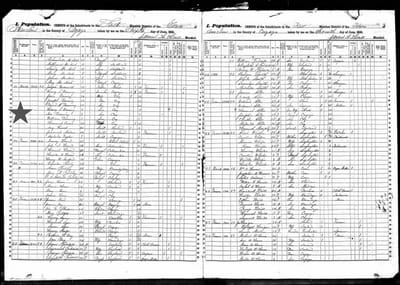
— Gatekeeper WikiDan61, upon rejecting the creation of a Wikipedia page for a signer of the Declaration of Sentiments.
Just because they aren't notable doesn't mean they didn't live important lives...
The 100 Signers Project is an undertaking designed to create a readily accessible, open resource that consists of short biographies for the 68 women and 32 men who signed their name to the Declaration of Rights and Sentiments at the 1848 Seneca Falls Convention. To the best of my knowledge, no anthology (comprehensive or otherwise) of these individuals exists. Judith Wellman's 2004 book The Road to Seneca Falls attempts to redress this absence, but valuable work still remains to be done.
For this project, I will utilize both contemporary scholarship and any archival materials that I can uncover. I think any new information about the signers will do much to create new insight into their lives and into this crucial chapter of American history. Who were the signers? Why did they attend the Seneca Falls Convention?
I hope this project might capture how the 100 signers of the Declaration, when viewed together, represent a hyperconnected and often overlapping network of proto-Suffragists, Abolitionists, Spiritualists, and Hicksite Quakers, hailing from the "burned-over district" of New York and beyond. A good number of the names present on the Declaration need no introduction, like Elizabeth Cady Stanton or Frederick Douglass. Yet many of the names on the roll have been lost to history. Who were these people? Did they live otherwise unremarkable lives? Perhaps they were merely bystanders—normal, everyday individuals who happened to be present for the signing of one of the most important documents of American history. Or not...
[Click on the signer's name below to access profile.]
December 2025 - Jonathan Metcalf
August 2025 - Joel Bunker
June 2025 - Lavinia Latham
April 2025 - Saron Phillips with Mayra Castillo-Gonzalez and Corey McCall
December 2024 - Susan R. Doty
June 2024 - Samuel D. Tillman
May 2024 - William Burroughs with Lorie Dalola
October 2023 - Mary E. Vail
July 2023 - Lydia Mount with Lorie Dalola
March 2023 - Margaret Pryor with Grace Roper and Lorie Dalola
January 2023 - William G. Barker
December 2022 - Catharine F. Stebbins
May 2022 - Rebecca Race
April 2022 -Martha Underhill with Hunter Bozelle, Madison Hare, Seth Mandryk, Scott Merritt, and Will Unruh
December 2021 - Harriet Cady Eaton
October 2021 - Isaac Van Tassel
August 2021 - S.E. Woodworth
July 2021 - Charlotte Woodward
May 2021 - Susan Quinn
April 2021 - Jacob Mathews
March 2021 - Dorothy Mathews
December 2020 - Delia Mathews
November 2020 - David Spalding
August 2020 - Margaret Schooley
July 2020 - Justin Williams
June 2020 - Eunice Newton Foote
June 2020 - Mary Conklin
May 2020 - Elizabeth Conklin
March 2020 - Henry W. Seymour
February 2020 - Henry Seymour
December 2019 - Malvina Seymour
August 2019 - Cynthia Fuller
July 2019 - Phebe King
June 2019 - E.W. Capron
December 2018 - Betsy Tewksbury
September 2018 - Robert Smallbridge/Robert Smalldridge
July 2018 - Mary S. Mirror/Mary L. Minor
June 2018 - Sophronia Mack Taylor
December 2017 - Experience Porter Gibbs
June 2017 - Azaliah Schooley
About The Creator
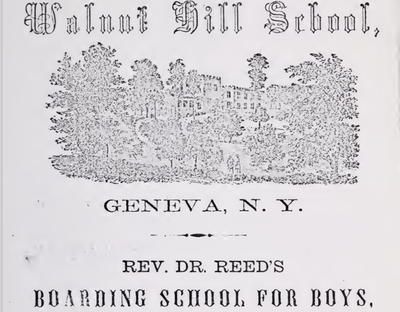
Bill Hunt is associate professor of American Literature at Barton College in Wilson, North Carolina. He holds a B.A. and M.A. from the University of Virginia and a Ph.D. from Duke University. He has twice completed semesters of Arabic-language coursework at Yarmouk University in Irbid, Jordan, and has worked at non-profit organizations in Beirut, Lebanon; Washington, D.C.; and Richmond, Virginia. He has served as vice president and president of Duke University’s Graduate and Professional Student Council.
He specializes in 19th- and early-20th-century American literature, with interest in Gender and Women’s Studies, Middle East Studies, Postcolonial Theory, Film Studies, and literatures of the American South. His dissertation is entitled “‘Suffragettes of the Harem’: The Evolution of Sympathy and the Afterlives of Sentimentality in American Feminist Orientalism, 1865-1920.” It explores the presence of the American Suffrage Movement in the Middle and Far East. It asks how Suffrage-affiliated authors wrote and thought about spaces identified as "harem," focusing on how they understood sympathy and sentimentality as forces for the reform and cosmopolitanization of non-Western cultures. His scholarship is often impelled by the notion that the American Suffrage Movement was essentially literary in character, as much as it was social and political.
Publications:
“‘it is good we are dreaming’: Double Consciousness and the Silent Hysterics of Rebellion in The Monarch of Dreams.” ESQ: A Journal of Nineteenth-Century American Literature and Culture, vol. 70, no. 2-4, Winter 2024, pp. 318-339.
“‘The Ghost in Search of Help’: Silas Weir Mitchell’s Sentimental Quarantine, Charlotte Perkins Gilman’s Sympathetic Utopia, and Sigmund Freud’s Mitleidsimitation.” Arizona Quarterly, vol. 78, no. 3, Fall 2022, pp. 29-60.
“‘An Unwelcome Present’: Simulation and Simulacra in the Unlikely Friendship of General Lew Wallace and Sultan Abdülhamit II.” Muslim and American Worlds before 1900, edited by John Ghazvinian and Mitchell Fraas, Bloomsbury, 2020, pp. 71-84.
“Our new arrangement of the world’: Anna Leonowens, Francis George Shaw, and Anti-colonial Fourierist Dissent in The Blithedale Romance.” Nathaniel Hawthorne Review, vol. 43, no. 1, 2017, pp. 35-61.
Et al. “MLA—The Year in Conferences, 2019.” ESQ, vol. 66, no. 1, 2020, pp. 133-149.
Et al. “C19—The Year in Conferences, 2016.” ESQ, vol. 63, no. 1, 2017, pp. 144-167.
Et al. “ASA—The Year in Conferences, 2014.” ESQ, vol. 60, no. 1, 2015, pp. 195-211.
Et al. “MLA—The Year in Conferences, 2012.” ESQ, vol. 59, no.1, 2013, pp. 112-131.
Conference Presentations:
“‘your feeling…may soften with time’: Recovering an Intersex Genealogy across Deep Time in Julia Ward Howe’s Laurence.” Society of Nineteenth-Century Americanists (C19), Pasadena, California, March 2024.
“‘Some civilized footsteps’: Colonial Hypochondria in The Journal of Julius Rodman.” Poe’s Longer Works. Modern Language Association (MLA), Philadelphia, Pennsylvania, January 2024.
“Manifest Matthias: Sojourner Truth’s Communal-Colonial Misadventures in the Prophet’s Kingdom.” American Communes. Society of Nineteenth-Century Americanists (C19), Coral Gables, Florida, April 2022.
“’It is good we are dreaming’: A Progressive Social Butterfly Fudges Dickinsonian
Solitude in The Monarch of Dreams.” Thomas Wentworth Higginson, Apart from Emily Dickinson. Modern Language Assn. (MLA), Washington, D.C., January 2022.
“The Island Effect: Gender and Political Power in ‘The Great Revolution in Pitcairn.’” Gender, Power, Twain. Modern Language Assn. (MLA), virtual, January 2020.
“‘The Ghost in Search of Help': Dr. Silas Weir Mitchell’s Sentimental Quarantines and Charlotte Perkins Gilman’s Sympathetic Utopias.” New Approaches to Charlotte Perkins Gilman. American Literature Assn. (ALA), Boston, May 2019.
“Repetition, Race, and Trauma in ‘A Tale of the Ragged Mountains,’ post- Charlottesville.” MLA, Chicago, January 2019.
“The Caliph and The General: Simulation and Simulacra in the Unlikely Friendship of Lew Wallace and Sultan Abdülhamit II.” Muslim and American Worlds, circa 1500-1900, University of Pennsylvania, April 2017.
“‘Kindling a Streak of Fire’: Gilman’s Evolutionary Sympathies,” The Sixth International Charlotte Perkins Gilman Conference, Harvard University, June 2015.
“'A kind of sub-pattern in a different shade': Androcentric Aesthetics and Ornamental Emergence in Charlotte Perkins Gilman’s 'The Yellow Wall-paper,'" New Approaches to Charlotte Perkins Gilman, ALA, San Francisco, May 2012.
“The Cemetery Sublime: The Southern Monumentalities of Faulkner’s Absalom, Absalom!” workshop-panel, Futures of American Studies Summer Institute, Dartmouth College, June 2010.
“Oppenheimer-Ahab and Nuclear Moby-Dick: Guilt and the Atomic Monster in Moby-Dick, Jaws, and Predator,” American Comparative Literature Assn. (ACLA), New Orleans, April 2010.
“’Agayns the proces of nature’: The Enclosed Gardens of 'The Franklin’s Tale,' The Travels of Marco Polo, and The Travels of Sir John Mandeville." North Carolina Colloquium in Medieval and Early Modern Studies, Duke University, February 2009.


